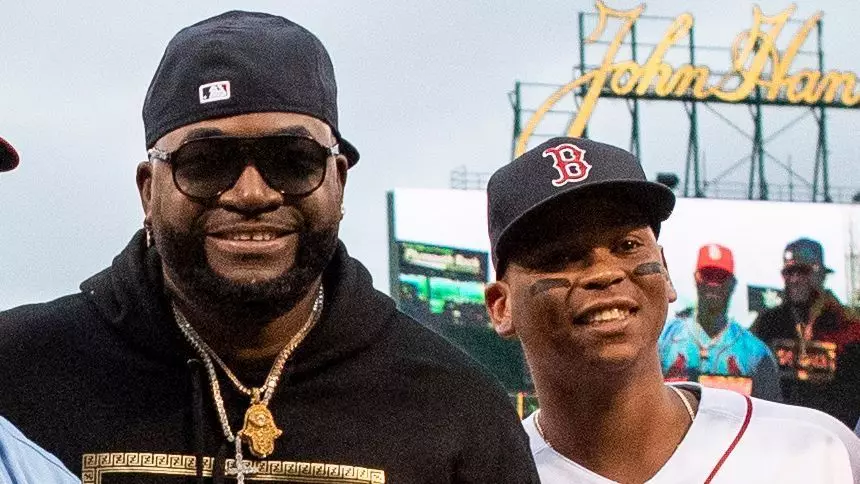The Boston Red Sox are at a crossroads regarding designated hitter Rafael Devers, a player whose talent is undisputed yet whose role on the team has become a topic of extensive debate. With the recent injury to first baseman Triston Casas, there’s pressure on management to reconsider Devers’ position. However, as Hall of Famer David Ortiz emphasized, the decision should ultimately rest with Devers himself. The shift in expectations, especially given the circumstances, raises questions about player autonomy and the pressures elite athletes face in the competitive landscape of Major League Baseball.
The Burden of Expectations
When Devers was signed with the intention of being a full-time designated hitter, that decision came with clear expectations that needed to be met. Now, with circumstances beyond his control forcing changes, the scrutiny on his performance has escalated. Ortiz astutely points out that Devers was initially asked to focus solely on hitting. Transitioning to a new position, especially one as demanding as first base, can disrupt the rhythm of a player who has been making strides in a defined role, evidenced by his .286 batting average and leading the league with 52 RBIs as of the latest updates.
The expectations placed on Devers may not only affect his performance but also his mental state. It’s essential to recognize that while the pressures of team dynamics are inherent in professional sports, the player’s comfort and readiness to adapt should take precedence. Ortiz encapsulated this sentiment effectively when he stated that any decision to practice first base should be rooted in Devers’ personal interest, not dictated by the organizational needs or fan base.
The Evolution of a Player
The nature of baseball has evolved considerably since Ortiz’s prime, marked by a shift in how players are utilized. Ortiz himself faced skepticism when he was labeled primarily as a designated hitter, a role that was often marginalized in earlier eras of baseball. Yet, his transformation into a prolific slugger defied those limitations. Devers stands at a similar critical point, where he has shown that he can excel in a designated role, growing into one of the Red Sox’s most reliable hitters. Ortiz’s insights serve to remind fans and management that the modern game must be approached with an understanding of the player’s journey and development.
The discussion surrounding positional changes is not merely about filling physical gaps; it speaks to a larger dialogue about player mentalities and their growth trajectories within the league. Ortiz made it clear that Imposing such drastic changes without considering a player’s autonomy can be detrimental. This perspective calls for a more player-centric approach, one where athletes are supported in pursuing their skills in contexts that feel comfortable and aligned with their personal goals.
A Balancing Act Between Team Needs and Player Preference
As teams navigate the turbulent waters of injuries and roster changes, the balance between organizational needs and a player’s individual preferences is critical. The Red Sox signed Devers knowing he would be the designated hitter, a role he has embraced and thrived in. Shifting him to first base could yield short-term gains in productivity but may jeopardize his overall growth and happiness in the long-term. When Ortiz mentioned that Devers should decide when and if he wants to practice first base, it reflected wisdom born from experience.
Moreover, the presence of a well-esteemed figure like Ortiz advocating for Devers lends credibility to the argument for choosing autonomy over obligation. Ortiz’s career was marked by periods of doubt, yet his resilience allowed him to turn those moments into triumphs. Encouraging Devers to assert his preferences demonstrates respect for his journey as a player and an individual. Ultimately, the responsibility lies not with the player alone but with the entire organization to cultivate an environment where athletes can thrive without unwarranted pressure to conform.
The Importance of Understanding Player Well-being
The intersection of player welfare and professional sports must not be neglected amidst the fervor of competition. Devers’ case is emblematic of broader issues within sports concerning mental health, performance anxiety, and the pressures to adapt quickly to changing circumstances. Ortiz’s comments shed light on a crucial facet of the game: players are not mere tools to achieve wins; they are individuals with aspirations, preferences, and the right to shape their careers.
As this season unfolds, the Red Sox organization must consider how they engage with players like Devers—fostering an environment that encourages personal choices while also addressing team needs. By doing so, they not only enhance their chances for success but also ensure that their athletes remain empowered, their voices heard amidst the clamor of professional sport.

